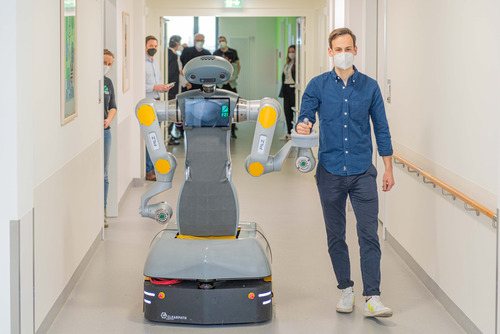
M. Sc. Julian Schneider
- Research Associate
- Group:
- Room: 107
- Phone: +49 721 608-43236
- Fax: +49 721 608-42707
- julian schneider ∂does-not-exist.kit edu
Karlsruher Institut für Technologie (KIT) Campus Süd
Institut für Regelungs- und Steuerungssysteme
Geb. 11.20 (Engler-Villa)
Kaiserstr. 12
D-76131 Karlsruhe
Curriculum Vitae
Studies of Mechatronics and Information Technology at Karlsruhe Institute of Technology (KIT). Bachelor thesis at the Institute of Control Systems (IRS) (2017). Internship at Daimler AG in automated inspection in car assembling (2018). Master thesis at IRS about intention based cooperative control for human-robot-interaction (2019). Member of the scientific staff of IRS since February 2020.
Research
Multi level connection for the consistent design of cooperative human-machine systems
To describe human-machine cooperation, level models are often used that describe the interaction between humans and machines on different sub-levels. In general, human activities and cooperative activities can be hierarchically divided into these sub-levels, e.g. navigation level (choice of route), trajectory level (choice of driving maneuver and trajectory) and action level (choice of steering angle and angle of the accelerator pedal) for the driving task. There are already promising methods for this level model approach that can be used for the design of cooperative systems. For the development of these methods, however, the interaction between human and machine has so far been viewed in isolation within one level (horizontal focus). Interdependencies and signals between the levels (vertical focus) have not been considered so far, but rather seen as given, such as the existence and the course of reference trajectories as the necessary input variable of the action level.
The aim of this research is to examine the connection between the levels and thus the vertical integration of the levels in the automation design. The aim is to answer the question of how a consistent design looks like when all levels are connected and in interdependency with one another. The focus is particularly on the design of the level interfaces as a prerequisite for human-machine interaction to be successful within the various levels.
A possible application where cooperation takes place on several levels and the interfaces between the levels become relevant is the support and escort of a walking patient by a robot. First, a common trajectory must be cooperatively negotiated (trajectory level). Subsequently, the negotiated trajectory is cooperatively controlled (execution level).


